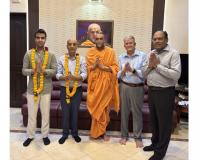Be Safe – Early Detection of Breast Cancer is a must says Dr. Garvit Chitkara

New Delhi (India), November 7: Breast cancer is a significant health concern affecting women worldwide. Dr. Garvit Chitkara, one of the renowned breast cancer surgeon in Mumbai, explains that detection of breast cancer, especially during the early and localized stage, increases the five-year relative survival rate to nearly 99%. He advises patients to conduct breast self-examinations every month and also seek clinical breast examinations and mammograms at regular intervals to stay safe and healthy.
Dr. Garvit Chitkara explains that people should look for changes in their breasts and approach a breast surgeon if they find anything unusual, such as nipple discharge or dryness with itching, a lump in the breast or the underarm area or thickening within that area or if the texture of the skin resembles the surface of an orange peel. The other symptoms include dimpling on the breast, change in the size and shape of the breast, swelling or shrinkage, which is either bloody or in clear form or inversion or inward turning of the nipple.
It is important to remember that a painless lump is more likely to be a cancer and hence any lump Painless or painful should be shown to a breast surgeon.
Feeling a lump in the breast is a sign of worry, but not all breast lumps are cancerous; hence, it is advisable to approach a doctor who could conduct a proper investigation. A breast lump is a mass, growth, or swelling within the tissue.
On the other hand, cysts in the breast may also feel like a lump, but it is a sac filled with harmless fluid. There can be more than one cyst in the breasts. Cysts can be painful and feel soft when touched and are painful on touch. Generally, cysts occur in premenopausal women and can be more than one in number. Very rarely a certain kind of cysts have hidden cancer / pre cancer in them. You must visit a breast oncologist if you have been diagnosed to have breast cyst. They will be able to differentiate between a harmless or harmful one.
The timing of the breast self-exam (BSE) is different for women who still get their menstruation and those who don’t or have attained menopause. A breast self-exam for menstruating women should be done 7 to 10 days after the first day of her menstrual cycle. E.g. if you had your period on the 1st of this month the days when you should be doing a BSE on 7th to 10th. The reason to do it on these days are because you have least tenderness on these days and any lumps or abnormalities are best felt on these days.
Women in their menopause should do a breast self-exam on the same day each month, such as the 1st or 30th of every month. A monthly breast exam is a must for women aged 25 and above. Women with these symptoms should seek a medical consultation. Mammography is recommended by the doctor in case abnormalities are detected during breast self-exams and by the doctor.
Mammography is a test in which X-rays examine the breasts for tumors and other breast cancer diseases. Mammography is used for screening as well as diagnosis purposes. Doctors recommend an annual screening mammogram for women aged 40 and above.
Dr. Garvit Chitkara busts the myth that women with a family history of breast cancer will always develop breast cancer. A positive family history increases the risk alone it does not guarantee that breast cancer will come. Neither is the contrary statement correct that if you do not have breast cancer in the family you will never get it. Only 10 percent of all breast cancer is because of genetic mutation rest happens without a genetic mutation or family history. Most women with breast cancer have no family history of the same. He states that if the patient’s blood relative has developed breast cancer, the patient should proceed for breast cancer examination ten years before the relative’s diagnosis.
The risk of breast cancer increases in the case of second-generation or multiple generations of relatives having breast cancer. Still, as a preventive measure, the patient should seek early screening with medical consultation to stay healthy and safe. The doctor will likely recommend a breast cancer gene test to detect the presence of breast cancer risk and increased risk of developing cancer.
Apart from breast cancer risk due to genetics and age, which cannot be avoided, adopting a healthy lifestyle is crucial to keep breast cancer at bay. It is necessary to maintain a healthy weight, consume adequate fresh fruits and vegetables, maintain a regular exercise routine, avoid smoking and alcohol consumption, and seek regular medical consultation that includes breast cancer screening.
About Dr. Garvit Chitkara
Dr. Garvit Chitkara is a leading breast cancer surgeon working as a Senior Consultant in Breast surgical oncology and oncoplasty at Nanavati Max Institute of Cancer care in Nanavati Max Super Specialty Hospital, Mumbai. He is an expert in breast oncoplastic surgeries, including breast cancer surgeries, oncoplastic breast reconstruction surgeries, and axillary conservation surgeries and is dedicated to offering the best possible comprehensive care.
He specializes in providing evidence-based, personalized treatment for the best possible outcomes. He has successfully treated thousands of patients across his career spanning 15 years through his customised approach and a state-of-the-art facility that offers the best possible recovery experience after surgery.
For further details, contact Dr. Garvit Chitkara –
Nanavati Max Super Speciality Hospital, Ville Parle West, Mumbai, Maharashtra 400056
Email: dr.garvitchitkara@gmail.com
Phone: +91-91673 28325
If you have any objection to this press release content, kindly contact pr.error.rectification[at]gmail.com to notify us. We will respond and rectify the situation in the next 24 hours.






